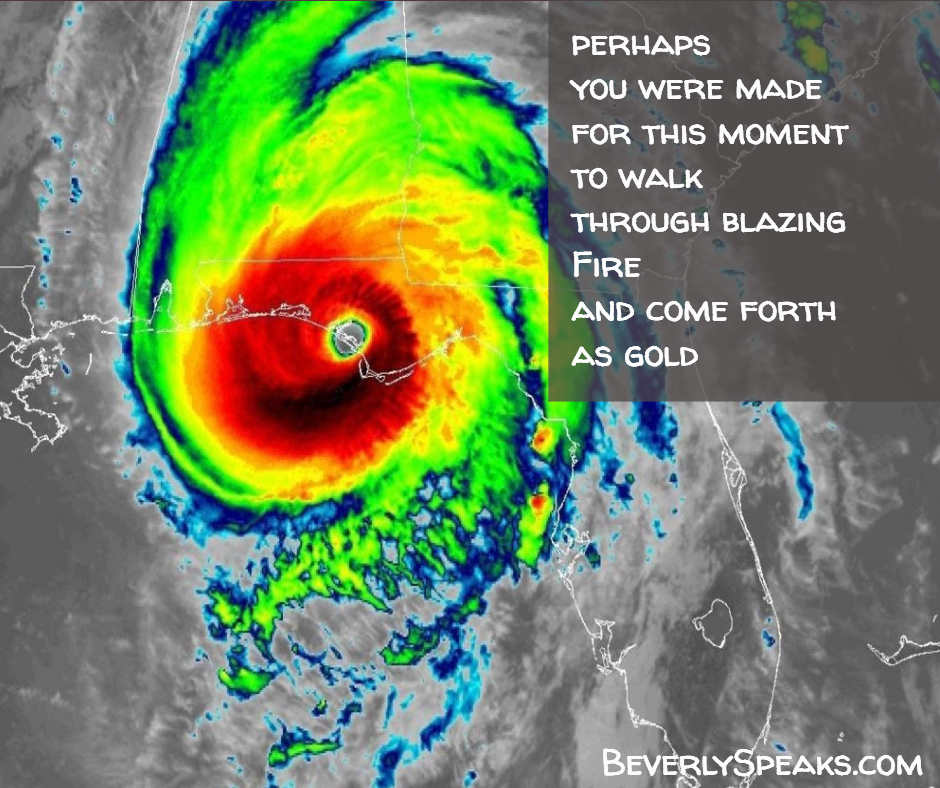
Disaster struck on Oct 10, 2018 – 6 months ago to this day.
We had a 48 hour window of time from when Michael came into the Gulf of Mexico as a Category 1 storm to when it plowed into us as a Category 4.9 with winds of 155 mph. There was nothing that could be done to stop it. We just braced for impact.
In all my years, I’ve never seen anything like Hurricane Michael’s path of destruction. A wide swath in Florida’s Panhandle experienced devastation that looks like an enormous bomb went off.
As I started scrolling through social media today, a wave of grief washed over me. I started seeing the images and hearing the haunting sound of the terrible wind on videos. That same grief hits me almost every time I get in my car and go somewhere.
Everyone living in this area has lost something important. We are recovering together. We have a long way to go. My optimism has stayed with me most days. There have been a number of bad days sprinkled in as well. I have hung unto hope. There’s a favorite passage in The Message that reads, “I’d say you’ll do best by filling your minds and meditating on things true, noble, reputable, authentic, compelling, gracious—the best, not the worst; the beautiful, not the ugly; things to praise, not things to curse. Put into practice what you learned from me, what you heard and saw and realized. Do that, and God, who makes everything work together, will work you into his most excellent harmonies.”
In keeping with that emphasis on the positive, I made a list of some things I’ve learned in the past 6 months.
10 Things Adversity Has Taught Me
- Ask the right questions. Why me?” is not the right question. Adversity is a hard teacher but the questions are as important as the answers. In preparation to teach a new online course, I was reviewing one of the exercises last week. It asks about the events that have been pivotal in your personal story. As I rated the events on my own list, I noticed that 90% of things I listed were not positive events. They were the hard things. But what I learned and how those events shaped me were very positive.
- Resilience can be learned. Resilience can be compared to a muscle. It gets stronger when you have to use it.
- There is no small act of kindness. The little things become big things when you’re walking through difficulties. A smile. A kind word. If it’s within your power to do it, don’t hold back.
- Stick together. For years, I’ve cited the research from the Harvard Life Study that emphasizes the importance of supportive relationships. We need one another. One key to navigating adversity is to accept help. Undoubtedly, our neighbors, friends, and family have made ALL the difference in our well-being.
- Disruption is an opportunity to innovate. Navigating out of the wreckage requires thinking differently. It requires creativity. When there’s no such thing as business as usual, you have to find new ways of seeing and doing.
- Stress depletes your reserves. You must find ways of making deposits or your health will suffer. Taking a break and giving yourself room to decompress is not optional.
- De-cluttering is a good thing. We had to pack our house up in about a week when the floodwaters started rising in the aftermath of the Hurricane. It was chaotic. But I had been meaning to clean out some of those closets for years. Most of us can live well with a whole lot less stuff than we have accumulated.
- Appreciate beauty. When everything around you is really ugly, find the beauty. John Muir said, “Everyone needs beauty as well as bread.” The brilliance of a sunset, the bloom of a small flower, the rich harmony in a song – count them as gifts. If you can’t find the beauty, create it.
- Be patient with people. Everyone is carrying a burden. People may be tired and cranky. They may be experiencing sleepless nights and panic attacks. Trauma is no joke. Be more tolerant than people deserve. You won’t be sorry.
- Spread hope. Hope is the oxygen of the human spirit. I remember falling out of a tree when I was a child and the breath was knocked out of me. I was quick to get back on my feet and brush myself off. The difference between kids and adults is a child will clamber right back up into the tree. Adults – not so much.
When I was in high school, I read Man’s Search for Meaning by Viktor Frankl and was profoundly impacted by his experience as an Auschwitz concentration camp inmate. The message in his book convinced me that nothing I would ever go through would compare with his heinous journey. I held on to the idea that if he could sustain hope in the darkest place our world has ever seen, hope could hold me steady all the days of my life.
My definition of disaster recovery before Hurricane Michael was calling an IT professional to recover the data when my computer’s motherboard fried. In the aftermath of one of the worst hurricanes to make landfall in the U.S., my perspective has changed.
Maya Angelou
History, despite its wrenching pain, cannot be unlived, but if faced with courage, need not be lived again.
